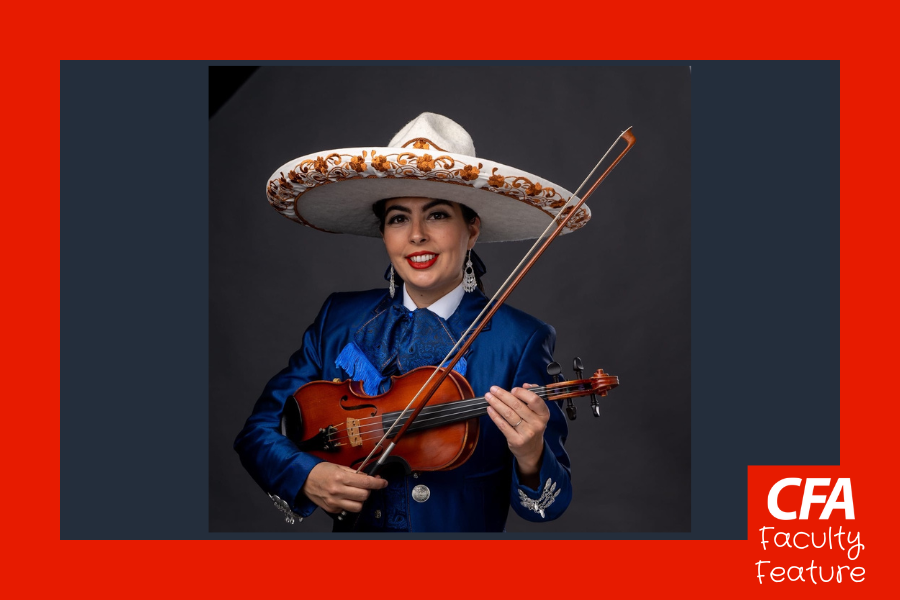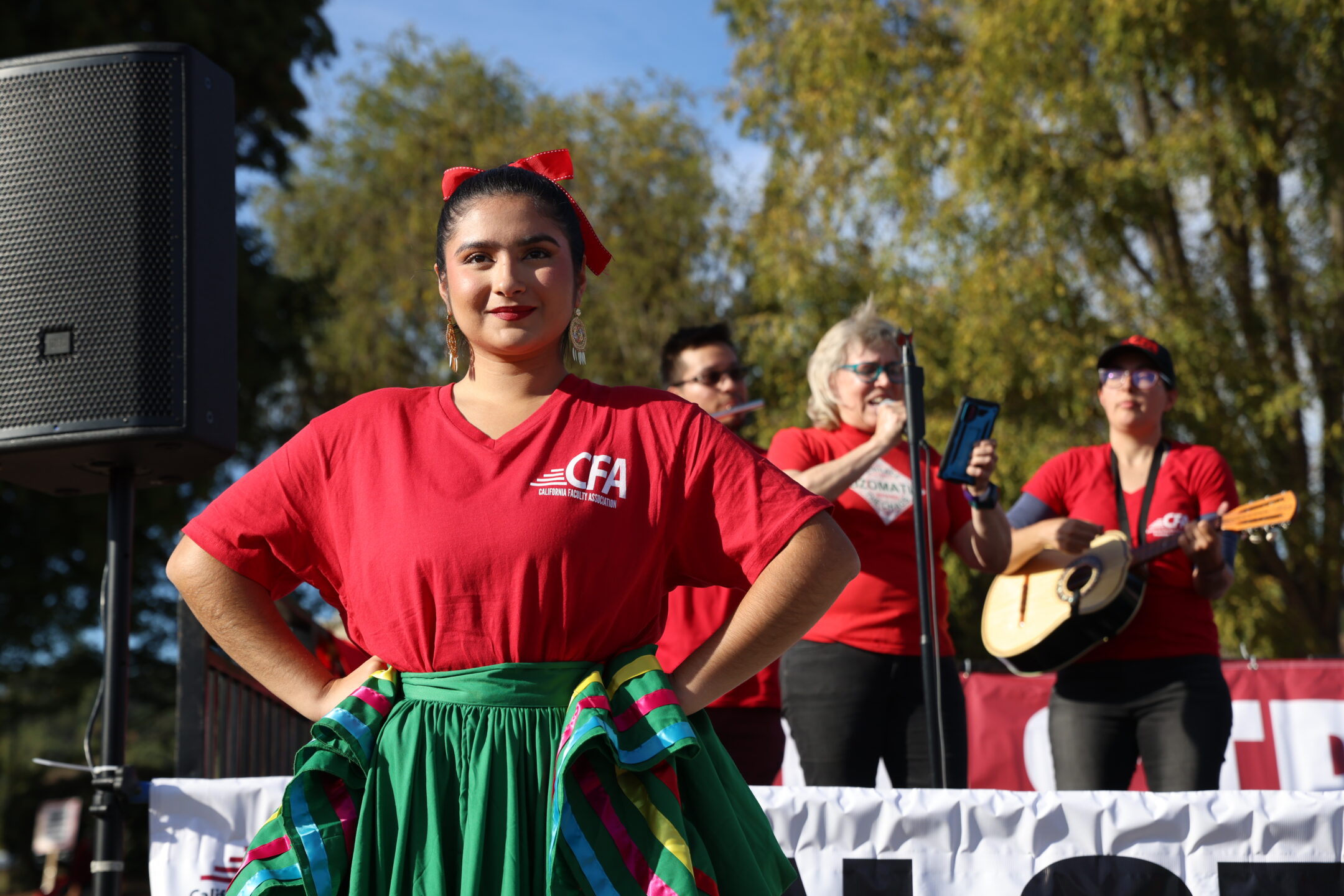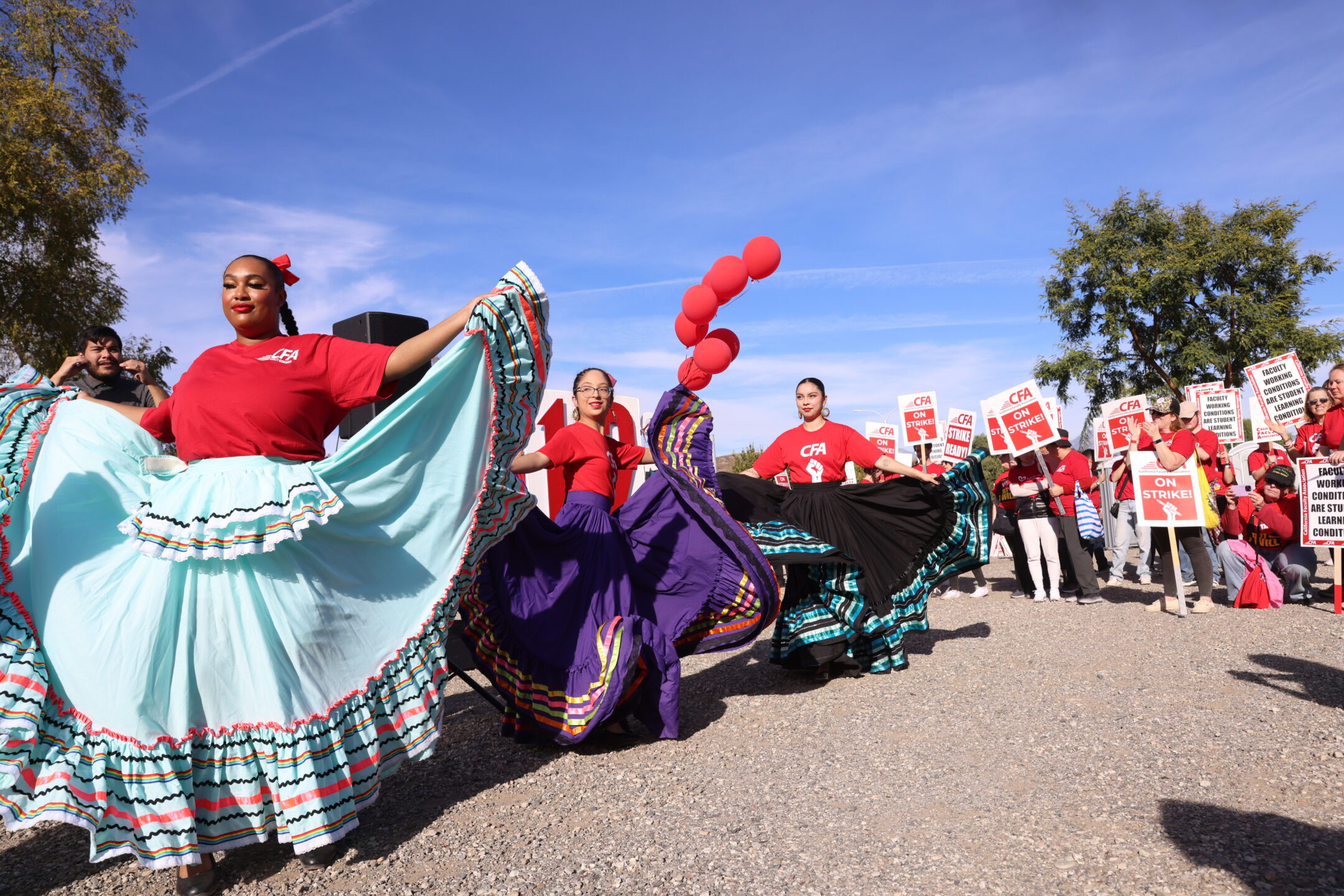Faculty Feature: Building Community by Singing Truth to Power
Performing during CFA members’ December re-opener contract strike was exhilarating for CFA Pomona member Jessie Vallejo.
“I felt proud of my students. I felt proud of the ways that we were able to bring energy and give back to the audience,” said Vallejo, Cal Poly Pomona Professor. “I thought the strike was a great moment to have students feel it, witness it, and advocate for a better educational experience.”

Emotions swelled at CFA Pomona members’ December 13 strike as Mariachi performers, accompanied by Folklorico dancers, played the iconic song long associated with the United Farm Workers (UFW) and the campaign for justice in the grape fields, “De Colores.” Vallejo made sure to add a little known verse around interethnic solidarity that she learned from early members of the group Mariachi de Uclatlán during her fieldwork at UCLA. She learned the lyrics from noted professor and ethnomusicologist David Kilpatrick.
De colores, de colores
Sí, de blanco y negro y rojo y azul y castaño.
Son colores, son colores
De gente que ríe, y estrecha la mano.
Son colores, son colores
De gente que sabe de la libertad.
Of colors, of colors
Yes, black and white and red and blue and brown.
All the colors, colors
From people laughing, and shaking hands.
All the colors, colors
From people who know liberty.
“I felt like it was such an honor to learn the oral history of Uclatlán playing that in the fields for the UFW,” said Vallejo.
Hundreds of CFA members chanted, marched and went on strike for expanded health and safety on campus, improved paid parental leave, gender inclusive facilities, and wage increases that respect the work faculty perform.
For Mariachi Palenque member Sally Hawkridge, performing with striking faculty members was personal. “Not only was it my chance to do some activism, but also honor my brother, too.” Her brother was a UPS employee and an active Teamsters member. He died in 2020 likely from complications related to COVID.
In addition, having been around academics she knows what faculty, especially women of color, go through. “I felt pride about the kind of people that I have been able to have in my life,” said Hawkridge. “I had a strong desire to give back.”
She performed Billy Bragg’s rendition of Joe Hill’s “There is Power in a Union.” She had learned the song from her brother.

Remembering the strike, Vallejo noted that collective singing links people on a biological level.
“You have the power to critique, to speak truth to power in ways that are hard for administrators to retaliate as opposed to someone giving a speech,” said Vallejo.
Leading up to the strike, Vallejo was happy to participate. Awareness of worker exploitation and the power of mass movements was woven into her upbringing along with an unwavering passion for music.
Growing up in Upstate New York as “one of two Mexican-American families in Syracuse,” she learned early on how to be attentive to the most mistreated.
Her father grew up in Los Angeles in the 1960s. They moved back east because Vallejo’s grandmother was from the East Coast where various family members also had connections to the West Coast. Despite coming to Los Angeles for the first time for grad school, she was surrounded by mythical stories about southern California.
Vallejo’s Italian family worked in unionized manufacturing shops with Carrier in Syracuse, New York.
Many family members died young due to cancer, likely from exposure to toxic chemicals, teaching Vallejo to “understand the importance of fighting for rights like safety.”
In school, books like “Jungle” by Upton Sinclair helped tie Vallejo’s causal family stories of exploitation to the greater struggle for workers’ rights.
As a professor, she doesn’t face industrial dangers. However, it’s never lost on her that she is a worker being exploited, as are so many others on campus, like the workers who keep the classrooms functional and make sure that ceiling tiles don’t fall.
Cal Poly Pomona students advocated for someone like Vallejo to be on campus and anchor a stronger relationship with the surrounding largely Latinx community.
The mariachi program, in part, is reversing Cal Poly’s administrators’ attempt to distance itself from the community in the early 2000s and rekindle a forgotten legacy of active and politically engaged groups in the 1960s.
Before Vallejo came to campus, Cal Poly Pomona had state-funded mariachi instruments. However, “the music department refused to let the students use the instruments because clubs couldn’t use instruments that were under state funds; they had to be through a class,” recounted Vallejo. In the face of what seemed like unfair bureaucracy, students protested.
Recently graduated, Cal Poly Pomona Gender, Ethnicity and Multicultural Studies major Marilyn Leiva has been dancing professionally for 17 years and teaching for 4 years. This last year she formed a Folklorico group on campus, Zapateando del Corazón. For Leiva, supporting the strike, “was the perfect way of having folklorico and activism come together.”
“It was a moment in time when you knew you were making history in our community and our school. We felt that power,” said Leiva.
For Leiva, Folklorico is not an aesthetic, it’s a narrative form that tells stories of resistance and triumph. For example, Grandeza Mexicana recently produced a show depicting Emiliano Zapata and the women (Las Adelitas) that shaped the Mexican Revolution.

Music and the community of resistance that it can create was never an obvious path for Vallejo.
“Nobody in my family has been a professional musician. But I just always really loved music,” said Vallejo.
She was only able to start playing violin after tricking her parents. They didn’t have much money growing up, so cost would be an issue. Her grocery store-working mother did her best to conceal their financial limitations by ensuring that small luxuries like Fruit Roll-Ups were purchased strategically. It was never a “no,” the answer was always “they will be on sale in two weeks,” remembered Vallejo chuckling.
In fourth grade, after Vallejo was called for music orientation, she casually told her mother that it was time to pick up her instrument, but it didn’t go well. As a middle child and self-identified “people pleaser,” she knew she needed to take a drastic step.
“I threw the biggest temper tantrum of my life and got my parents to let me start in music,” remembered Vallejo. She never put the violin down since.
Vallejo’s pathway to a deeper relationship with her heritage and future career was grounded in playing violin. A senior project during her undergrad allowed her to go to Mexico, meet extended family, and learn mariachi.
What drew Vallejo to PhD work in musicology was thinking about music as a social and emotional experience as much as it is personal, creative, or artistic. “A lot of my trajectory has been thinking about how music and mariachi, being very working class, really resonates with these movements and has been central to them for decades.” Vallejo even came to learn that Mariachi helped shape the aesthetic of the Cuban Revolution after Castro took power from the Bautista dictatorship.
For Vallejo, music is resistance, and she will continue performing and insisting on a better CSU for everyone. “I know that if we want any type of rights, we need to hold strong as a union and make sure we don’t get exploited,” said Vallejo.
Join California Faculty Association
Join thousands of instructional faculty, librarians, counselors, and coaches to protect academic freedom, faculty rights, safe workplaces, higher education, student learning, and fight for racial and social justice.